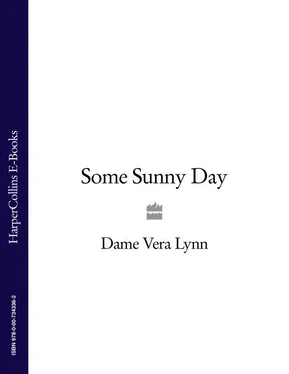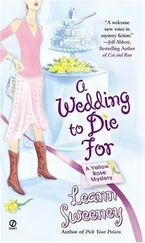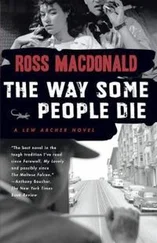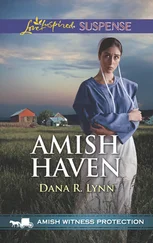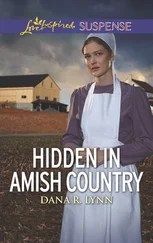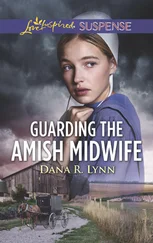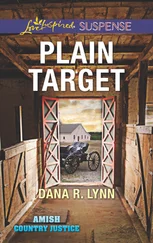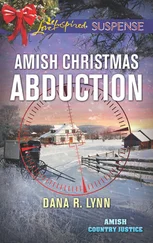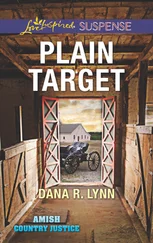SOME SUNNY DAY
MY AUTOBIOGRAPHY
Dame Vera Lynn

To my wonderful Harry, with whom I was so fortunate
to share my life for all those years.
And to ‘The Boys’, to whom we all owe so much—
your spirit and humour live with me to this day.
Never forgotten.
Cover Page
Title Page SOME SUNNY DAY MY AUTOBIOGRAPHY Dame Vera Lynn
Dedication To my wonderful Harry, with whom I was so fortunate to share my life for all those years. And to ‘The Boys’, to whom we all owe so much— your spirit and humour live with me to this day. Never forgotten.
Acknowledgements Acknowledgements Imust thank all my family, of course, for their constant support and love. And there are too many others whom I have met and worked with over the years to thank here, so I will mention just three: my dear friend Wally Ridley, for his help in those Denmark Street days; Joe Loss, for selecting me for my first broadcast; and Norman Newell, who produced all my early records. These three men were instrumental in making my life the extraordinary event that it has been.
Introduction
Chapter One: Overture & Beginnings
Chapter Two: One-&-six for an Encore
Chapter Three: Vocal Chorus
Chapter Four: A Taste of Ambrosia
Chapter Five: Wild About Harry
Chapter Six: A Country at War
Chapter Seven: Sincerely Yours
Chapter Eight: Off to see the Burma Boys
Chapter Nine: A Journey with a Legacy
Chapter Ten: A House is a Home
Chapter Eleven: After the Interval
Chapter Twelve: Not My Style
Chapter Thirteen: Round & About
Chapter Fourteen: Everybody’s Talking
Chapter Fifteen: Never Quite Retired
Index
Copyright
About the Publisher
Imust thank all my family, of course, for their constant support and love.
And there are too many others whom I have met and worked with over the years to thank here, so I will mention just three: my dear friend Wally Ridley, for his help in those Denmark Street days; Joe Loss, for selecting me for my first broadcast; and Norman Newell, who produced all my early records. These three men were instrumental in making my life the extraordinary event that it has been.
Iwill always remember the moment war was declared at the beginning of September 1939. I was sitting in the garden of the new house I had bought in Barking with Mum and Dad. Life was going well for me: I was singing with Bert Ambrose’s band, fulfilling what was really the only ambition I had ever had: to be the best singer with the best band in the land. Before the announcement came, anyone would have told you that times were not easy, but my life was certainly not bad.
On that day I remember we were all drinking tea in the garden, my dad sitting in his deckchair as he loved to do. He was always brown from sitting in the sun. Naturally we had the radio on all the time because everyone was interested in what was going on. For weeks everyone had been on tenterhooks, not knowing what was going to come. And that’s when I heard the news. The first thought that came into my head was a selfish one: Oh dear. There goes my singing career. Everything I have dreamed of, I thought to myself, is over. The men—including all the musicians I knew in the band—would all be going away to fight. And I would be headed straight for the munitions factory. I was only twenty-two. It seemed like the end of my world.
At that point no one thought that entertainment would become essential during the war. And I certainly never thought I would have the chance to continue singing. I was already very familiar with the words to ‘We’ll Meet Again’ by then, but I had no idea that that particular song would become the tune people most associated with the war era. Or that my voice would become the one that most reminded people of the hope for the future we needed to have at that time.
Seven decades later I remember that day as clearly as if it were yesterday. So it makes me especially proud and honoured to know that all these years later people still want to mark the anniversary. This year, 2009, marks seventy years since the outbreak of the war as well as the sixty-fifth anniversary of D-Day, the biggest wartime operation ever. It’s difficult for me to believe that it was that many years ago, because in my mind there are times when it feels so recent. It thrills me to know that people still remember and still care. It’s so important.
This year also marks exactly seventy years since I first sang that well-known song, the one that made my name, on tour with Ambrose’s band in the autumn of 1939. Ironically, precisely a year before that, I was on stage while history was being made. On 29 September 1938 I was performing at the Hammersmith Palais in London. Meanwhile the British Prime Minister, Neville Chamberlain, was in Munich for a meeting with Hitler. This was the meeting where Chamberlain believed he had received the reassurance that there would be ‘peace for our time’. Which, as we know now, unravelled within the space of the next twelve months.
In many ways I feel honoured and privileged to have become a symbol of that era. It’s very humbling. But there have been times in my life when I have felt uncomfortable about it too: it is something to live up to when people call you a national treasure, and that is certainly not an expression I would use myself. I just see myself as someone who found herself in the right place at the right time—or perhaps we should call it the wrong time—and I just happened to have a voice which suited the era and, somehow or other, has stood the test of time.
I’m told that schoolchildren today still learn the words to ‘We’ll Meet Again’. That thrills me. It seems that the songs I am remembered for from the war have passed from generation to generation, so that young people today know about them. I still feel a part of things. I have kept myself busy in my semiretirement: I have a garden I look after (with help) and I still drive—but only locally. I feel fortunate that I’m in a position where for the past thirty years I have been able to spend time on the charities I support, such as Breast Cancer Research and my trust, which helps children with cerebral palsy. And, of course, I still like to help organizations such as the Royal British Legion, which supports ex-servicemen.
Almost forty years ago I published an earlier version of my memoirs. This was at a time when I was still appearing regularly in my own television show and—astonishingly to me—my career was still going strong some thirty years after the war. Towards the end of that decade—the 1970s—I began the slow process towards retirement, although I have never really wanted to step completely out of the spotlight. Now that I am ninety-two, barely a week goes by without someone asking me to cut a ribbon at some event or other, and I am more than happy to oblige.
At my ripe old age, though, I felt it was time to revisit that era properly and get everything down on paper in a final account. I have also found that as the years pass I remember some things with a clarity that I didn’t have before. My trip to Burma, for example, looms large in my memories as one of the pivotal moments of my life. I didn’t really understand that when I was in my fifties. In this book, for the first time I have been able to recall that trip in a lot more detail—and I even found the red leather Collins diary I carried with me throughout. I’m particularly fond of that little diary, because I wasn’t supposed to keep it: we were not allowed to take any notes in case they fell into enemy hands. I wrote in it in tiny spidery handwriting that I thought the enemy would never be able to read.
Читать дальше
